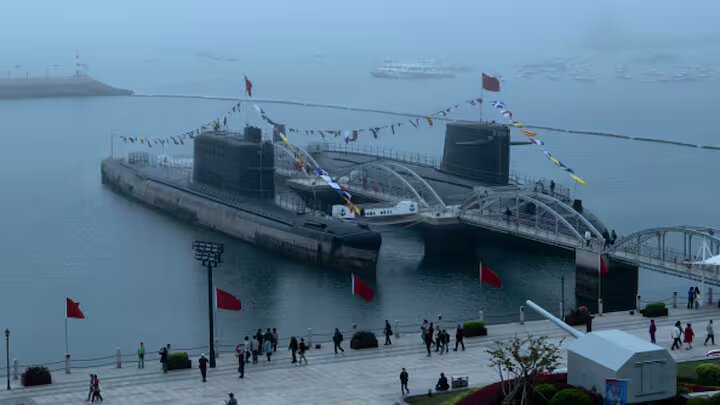The Indian Navy’s Project-75I plan to buy six next-generation submarines is still in limbo, but Pakistan is moving quickly with its own submarine program.
China launched the first of eight Yuan-class submarines (Type-39A) for Pakistan’s Navy three days ago, on April 26. In Pakistan, these submarines are called Hangor classes. The launch took place at the Wuchang Shipbuilding Industry Group (WSIG) factory in Shuangliu, China.
China agreed in 2015 to give Pakistan eight advanced submarines. Four of them will be built at the WSIG site in China, and the other four will be built at the Karachi Shipyard & Engineering Works (KS&EW) in Karachi, Pakistan.
A lot of technology will be sent from China to Karachi to be used in the building of the four.
But Project-75I, the Indian Navy’s plan to buy six next-generation submarines with air-independent propulsion (AIP), is still up in the air.
For the past fifteen years, the Indian Navy has been trying to get these new subs. Even after all this time, the project hasn’t come to life. The only countries involved are Germany with their Type-214 submarines and Spain with their S-80 subs.
The project has been held up many times because of not having enough money, making decisions, and unreasonable contract requirements.
A navy team went to Germany at the beginning of the month to do a field inspection of the AIP system given by ThyssenKrupp Marine Systems (TKMS), which is the German company in the P-75I program. That’s also what the team will do when they go to Spain with their offer.
The name “AIP” says that it is a way for submarines to move that doesn’t use air from the atmosphere. Normal diesel-electric submarines have to come to the surface a lot to get oxygen from the air. Their diesel engines make power that charges their batteries. Then, these batteries power the electric motor, which turns the propeller to make thrust.
AIP is on most of the submarines in the Pakistan Navy. Since the 2000s, AIP has been put on the Agosta-90B ships that the Pakistan Navy got from France.
The eight subs in the Hangor class will also have AIP.
But the Indian Navy doesn’t have any.
In fact, the Indian Navy is not even getting the newest French Scorpene-class submarines yet, and they do not have AIP. When it gets its first planned refit in 2024, the first Scorpene-class submarine, INS Kalvari, is likely to get an AIP system designed and built in India by the DRDO.
Even worse, there are rumors that the DRDO-developed system may face more delays, which would make the timetable for putting indigenous AIP in the Scorpene-class submarines even longer.
The Indian Navy doesn’t have enough subs right now. Pakistan has five standard diesel-electric submarines and eight Hangor submarines on order, while China has sixty-six submarines and Pakistan has only sixteen.
Almost always, some subs in a fleet are being fixed up at any given time.
This means that only a few of the 16-submarine force can be used at any given time. The Indian Navy sent 11 of these types of conventional submarines to the Indian Ocean Region (IOR) at the same time last month.
We don’t know how long these subs, which are three to four decades old, can keep working at this fast rate.
As a temporary fix, the navy has chosen to buy three more Scorpene submarines from France to make up for the fact that the older submarines are becoming less useful. This was made public when PM Modi went to France in July 2023.
However, talks about how much the extra three submarines will cost have not yet begun, which suggests that there will be more delays. In the meantime, China is growing the size of its attack submarine fleet and sending dangerous submarines to Pakistan.
There are rumors that Pakistan could also use the nuclear-armed Babur-3 cruise missile that is fired from these Hangor-class submarines.
India needs to get moving on getting the P-75I subs into the water and also starting work on the next submarine program, Project-76, which will be made in India.
